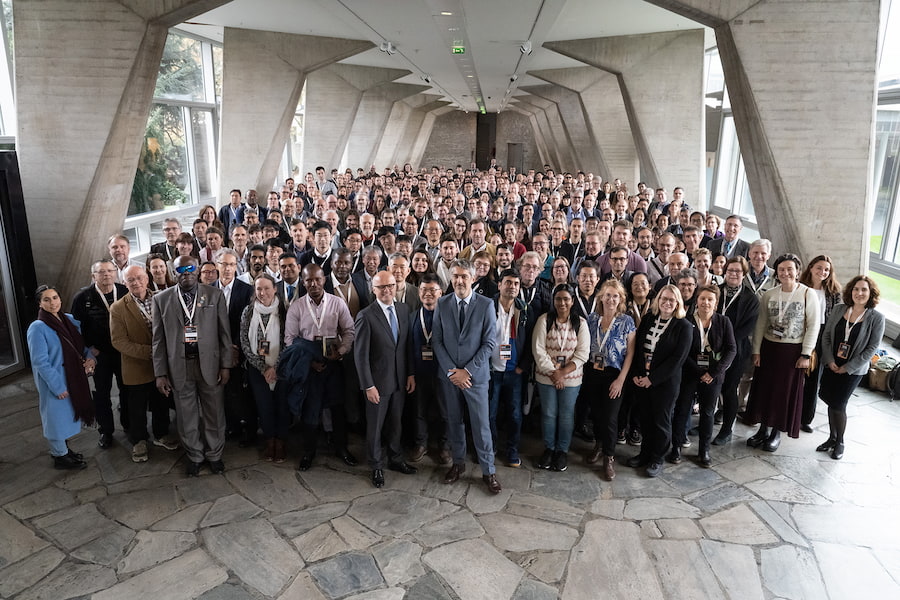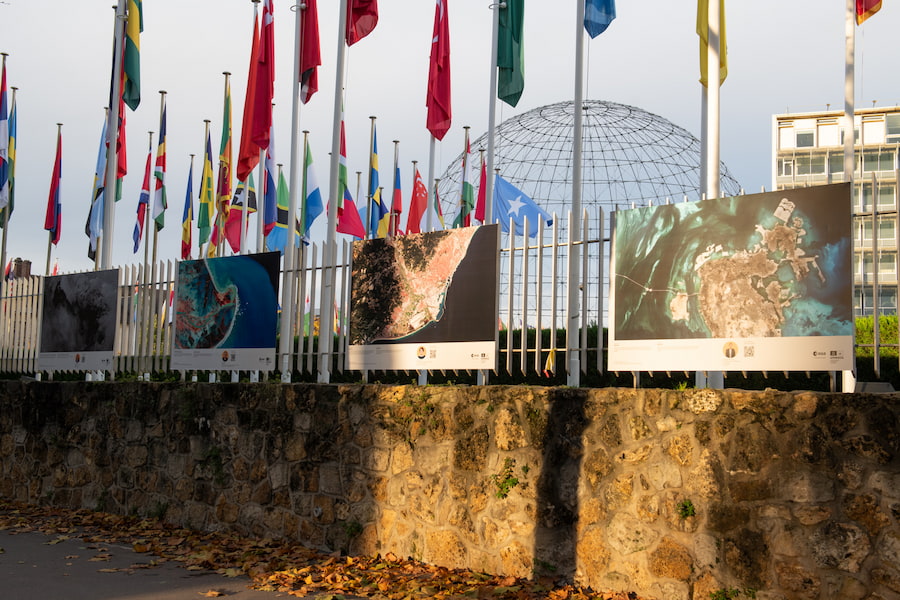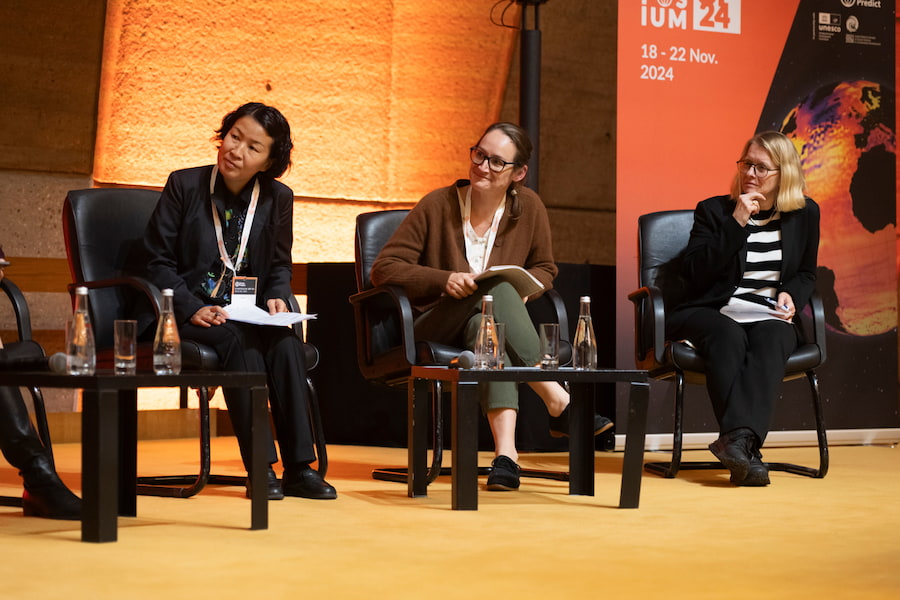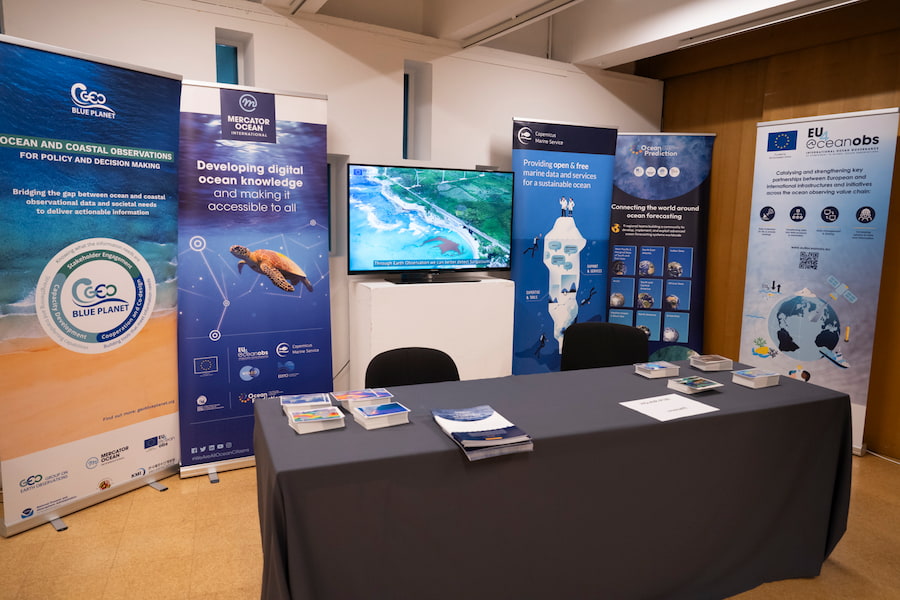In November 2024, ocean and atmospheric scientists, observation specialists, industry representatives, service providers and users of ocean data and products gathered at OceanPredict Symposium 2024 (OP‘24). Held in Paris, France, the symposium covered vital issues – the direction of operational oceanography, identifying the changing needs of users, bolstering international coordination and community-building, and aligning with the UN Ocean Decade vision.
EU4OceanObs underscored Europe’s role in advancing ocean observation, predictive capabilities, and the transformative potential of data-driven innovation and international collaborative efforts.

International mobilisation for ocean prediction in the framework of the UN Ocean Decade
Supported by EU4OceanObs, the “International mobilization for ocean prediction in the framework of the UN Ocean Decade” session highlighted EU4OceanObs’s commitment to fostering EU-to-international cooperation. Part one of the session, “The implementation of UN Decade Ocean digital ecosystem,” brought together ocean forecasting, observing, and data-sharing stakeholders to discuss innovations in digital ocean solutions and catalyse action in response to evolving ocean conditions.
First, Jan-Bart Calewaert (IOC-UNESCO) introduced Vision 2030 for the Ocean Decade, focusing on Challenge 8, “Digital Representation of the Ocean,” highlighting a decade-long multi-stakeholder effort to enhance the ocean data value chain. Next, Nicolas Segebarth (European Commission, DG Research and Innovation and EU4OceanObs) presented the “ EC vision for a digital ocean knowledge system and the strategic partnership with IOC-UNESCO” in line with the Ocean Decade Vision 2030 and the EU Mission Ocean 2030 to protect and restore our ocean and waters, prevent and eliminate pollution, and develop a carbon-neutral blue economy. The EU Digital Twin Ocean (EDITO) infrastructure, recently endorsed as an Ocean Decade project, will play a central role in this effort. The importance of ensuring interoperability and enhancing capacity building was also emphasized.

Following these presentations, representatives from leading Ocean Decade programs primarily attached to the OceanPrediction Decade Collaborative Centre (DCC) and the Decade Coordination Offices (DCO) for Ocean Observing and Data Sharing convened for a panel discussion on developing a digital ecosystem. Participants included representatives from DITTO, the Ocean Best Practices System, ForeSea, CoastPredict, ObsCoDe, Ocean Data 2030, and EMODnet to enhance collaboration on developing a digital ecosystem and discussing data standards. With such initiatives lining up with EU priorities, the session also aimed to engage European initiatives in the wider Ocean Decade more deeply. Alongside the Decade structures, key EU ocean observing and forecasting activities, such as the Copernicus Marine Service, EMODnet, and the EU Digital Twin Ocean, were highlighted for their role in advancing the goals of the Ocean Decade.
Part two of the session, “International mobilization for fit for purpose Ocean Prediction capabilities,” featured a collaborative discussion on how international partnerships foster advancements in ocean forecasting. Participants included Joanna Post (IOC-UNESCO, GOOS), Lidia Curcurull (NOAA), Katy Hill (World Meteorological Organization – WMO), Marie Drevillon (Mercator Ocean International, co-chair of ForeSea), Fraser Davidson (Environment and Climate Change Canada), Guimei Liu (National Marine Environmental Forecasting Center, China), and Audrey Hasson (Mercator Ocean International and Head of the GEO Blue Planet European Office). The roundtable discussed the essential role of international partnerships in fostering advancements in fit-for-purpose ocean prediction capabilities across the ocean observation value chain. From observations, modelling, and predictions to users, participants stressed the fragility of the current ocean observing system and the urgent need for nations to strengthen and expand the Global Ocean Observing System (GOOS) to ensure the sustainability of critical ocean observing infrastructure. Collaboration with space agencies is vital for maintaining a long-term satellite observing system. Equally, integrating satellite and in situ systems is essential. The panel highlighted how global initiatives such as GODAE – the Global Ocean Data Assimilation Experiment and OceanPredict/ForeSea demonstrate that international cooperation is critical in fostering robust forecasting systems, validation frameworks, and performance standards, which benefit both research and operations.
Discussions moved to the OceanPrediction DCC, which provides the framework to link together the different ocean prediction initiatives in the UN Decade and expand these very much-needed activities. Interactions between OceanPrediction DCC and the WMO Implementation of Earth System approaches are also an opportunity to capitalise on the combined strengths of the ocean, weather and climate communities. Panellists also discussed GEO Blue Planet, the ocean and coastal arm of the Group on Earth Observation (GEO), which works to bridge the gap between ocean data and societal needs by delivering actionable, tailored information. Future interactions between GEO Blue Planet and OceanPredict/ForeSea in the framework of the OceanPrediction DCC will be key to ensuring the development of fit-for-purpose ocean prediction capabilities.
Finally, panellists highlighted the upcoming UN Ocean Conference (UNOC-3), taking place in June 2025 in Nice, France, as a crucial venue to promote a call for global action. The high-level event, which brings together stakeholders from across the globe, will provide an opportunity to push for international collaboration and mobilization across the entire ocean observation value chain and build on the outcomes and recommendations of the OceanPredict’24 symposium.

Data, policy, and the ocean observation value cycle
Audrey Hasson, Head of the GEO Blue Planet European Office, delivered the keynote for the “User applications and societal benefits” plenary session. The presentation, “From Data to Policy: The Ocean Observation Value Circle,” highlighted the role of EU4OceanObs as a science-diplomacy instrument, catalysing essential partnerships between European and international infrastructures and programmes across the ocean observation chain.
The keynote spotlighted the role of GEO Blue Planet – an EU4OceanObs-supported initiative that bridges the gap between ocean data and societal needs to deliver actionable information. Three core action areas guide the work of GEO Blue Planet; “stakeholder engagement” to understand what the information needs are; “cooperation and co-design” to build the tools to meet information needs; and “capacity development” to strengthen and transfer capabilities. Audrey Hasson highlighted vital activities such as the Marine Litter Working Group, the Ocean Observation and Prediction for Coastal Sustainability in Africa workshop in Nairobi (Kenya) to engage stakeholders at the national level, and inclusive collaboration and engagement with stakeholders, including technical experts from academia and private section, and end-user representatives from national, regional, and intergovernmental bodies. Looking ahead, Audrey Hasson closed the keynote by emphasising GEO Blue Planet’s evolving focus. While GEO Blue Planet has traditionally focused on Earth Observations, ocean predictions will take a more prominent role over the next five years.
The “Our Ocean From Space” exhibition
Although the Symposium has now ended, the EU4OceanObs sponsored “Our Ocean From Space” exhibition, hosted at the gates of the UNESCO headquarters in Paris, runs until December 31, 2024. The exhibition combines stunning satellite imagery from the European Space Agency, Copernicus Marine Service, and other contributors with interviews featuring scientific experts, local decision-makers, and coastal stakeholders. These elements showcase how ocean observation and prediction support ocean protection and sustainable use.

Additional information
- Visit the Ocean Predict Symposium website: https://www.oceanpredict24.org/
- Learn more about the ForeSea programme: https://oceanpredict.org/un-decade-of-ocean-science/foresea/foresea-contributions-to-the-un-decade/
- Read about how the European Commission and IOC-UNESCO are joining forces on the UN Ocean Decade: https://research-and-innovation.ec.europa.eu/news/all-research-and-innovation-news/european-commission-and-ioc-unesco-join-forces-un-ocean-decade-2024-04-12_en
- Visit the GEO Blue Planet website: https://geoblueplanet.org/
- Learn more about the “Our Ocean From Space” exhibition: https://www.oceanpredict24.org/content/exhibition




